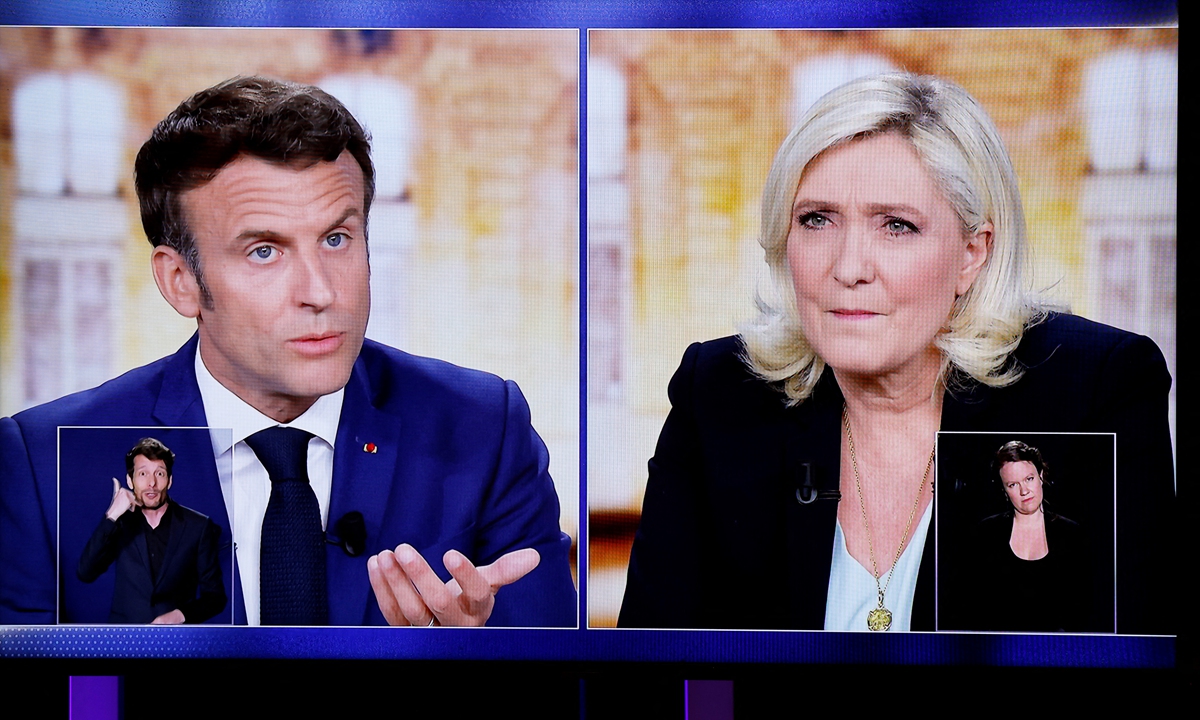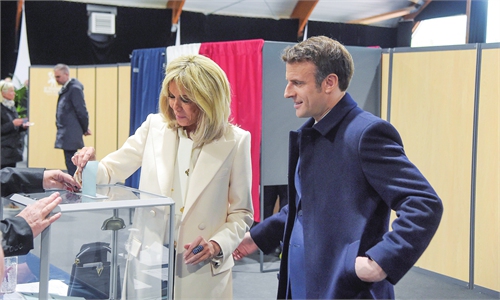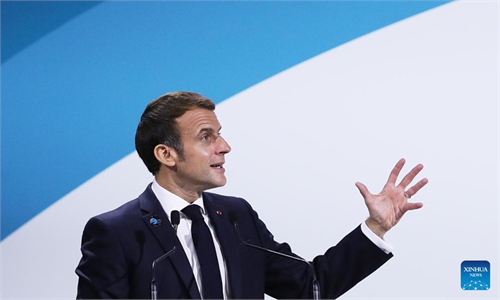US, EU show keener interest in French elections, ‘reflect West’s anxiety’
Close observation on French election shows West's anxiety: experts

A TV screen displays the debate between Emmanuel Macron and Marine Le Pen.Photo: AFP
French voters began casting their ballots in the second and final round of the presidential election on Sunday as the centrist incumbent President Emmanuel Macron and his far-right rival Marine Le Pen face a final runoff. The US-led West is closely observing the result as some 48.7 million eligible French voters got to the polls, with most Western media and Wall Street anxiously waiting for the result.Some experts said this shows their intention of "getting involved" in the election given the position of France in Europe amid the Ukraine-Russia crisis and its future ties with the US-led Western bloc, reflecting a widely shared anxiety.
As polling stations opened Sunday morning, Macron was asking voters to trust him for a second five-year term, and if he is re-elected, it would make him - who rose to power in 2017 aged 39 - the first French president in 20 years to win a second term, AP reported. The report noted that the result of voting in France, which is also a nuclear-armed nation with one of the world's biggest economics, could impact the Ukraine-Russia crisis.
CNN said in a headline that "Emmanuel Macron and Marine Le Pen face off again, with France's future direction at stake," claiming in a report that although Le Pen has abandoned some of her more controversial policies, like leaving the EU and abandoning the euro, experts say many of her proposals would still put France on a collision course with the EU.
Other US media outlets like the New York Post and Newsweek highlighted the point that Macron urged the public to vote in order to prevent a "Trump-like upset" if they hand victory to Le Pen, and by comparing a potential Le Pen victory to the UK vote for Brexit.
Such close observation by Western media and the US-led West overall reflects their anxiety, as the French election has been marked by polarization, a preference for France and for Europe as a whole or to make the continent more independent, or even distance itself from the US, Su Hao, founding director of the Center for Strategic and Peace Studies at the China Foreign Affairs University, told the Global Times on Sunday.
"Such tendency has actually become more prominent in recent years. And in the Ukraine-Russia conflict, as the largest beneficiary, the US is trying to kidnap the EU on its chariot, but the French election shows that French people and politicians are not viewing the West as a whole entity dominated by the US," Su said.
In contrast to some European countries or NATO members that have been following every step of the US, France has been striking a balance between Russia, Europe and the US. Macron said in 2019 that keeping Russia out of the Western fold is a strategic error, and in February, he said he was optimistic he could secure a de-escalation of the Ukraine situation as he traveled to Moscow to meet Russian President Vladimir Putin.
Now, it is like Europe and the US are much more worried about the result than France itself, as they think one "Trump" was enough trouble, and another female "Trump" would be a problem, as Le Pen had suggested withdrawing from NATO and so on, Wang Yiwei, director of the Institute of International Affairs at the Renmin University of China, told the Global Times on Sunday.
"Now both the US and Europe are attempting to get involved and closely watching the result of the French election, as if once Le Pen is in power, Russia wins as well," Wang said.
An Ipsos and Sofra Steria poll for daily newspaper Le Monde, published just before campaigning officially stopped on Friday, showed Macron leading with 56.5 percent of the vote to Le Pen's 43.5 percent, The New York Times (NYT) said on Sunday. Macron appeared to have widened his lead, possibly decisively, during the two weeks since the first round of voting on April 10, according to media reports.
Still, the likelihood of a high abstention rate and the reluctance of many of the 7.7 million people who voted for Jean-Luc Mélenchon, the narrowly eliminated hard-left candidate, to switch their vote to Macron has left lingering uncertainty hanging over the result, the NYT said.
Besides the US-led Western public opinion, Wall Street also shares high expectations for a Macron victory. Goldman Sachs has put its weight behind the opinion polls, citing 90 percent odds for a Macron win, CNBC said. And Citigroup's base case is also for a Macron win, its probability is less clear cut at just 65 percent.
In addition to worries about a Le Pen victory that could break up a West-driven anti-Russia alliance, there are concerns about whether her victory would signal a heavy blow to the Western political system, as from the UK's Brexit to the US election of former president Donald Trump, France would become the third major Western power to elect a populist, Song Luzheng, a France-based research fellow at the China Institute, Fudan University, told the Global Times on Sunday.
Although Chinese experts interviewed by the Global Times on Sunday share the same forecast that the chances for Macron to be re-elected are bigger, some do not see any chance that the next French government will fix the deep-seated problems that French society has been facing in recent years, especially when the far-right and far-left political groups have been on the rise and the Ukraine-Russia crisis will profoundly change Western society.
"The conflict between Russia and Ukraine indeed leads to a division of Europe into a structural confrontation between two camps," Su said, noting that the US-led conflict has put the European countries including France and Germany into hot water, which are facing long-term losses from energy and grain supply.
"As time goes by, those losses will become more palpable, which will affect public opinion and their political inclinations," he said.



